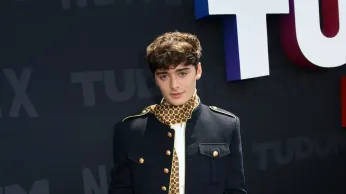
Oct 17
Noah Schnapp Reflects on Early Press Scrutiny Over Sexuality
READ TIME: 4 MIN.
Noah Schnapp, the 21-year-old actor best known for playing Will Byers on Netflix’s 'Stranger Things', has spoken candidly about the pressures he faced as a child actor, particularly regarding questions about his sexuality from journalists. In a recent cover story for Time Magazine, Schnapp shared that he was first asked directly if he was gay by members of the press when he was only 13 years old, a period during which he was still coming to terms with his own identity. “When I was younger, I was obviously very scared of talking about it,” Schnapp recalled. “They would pry and ask me, ‘Is he gay? Are you gay?’ I was 12, 13. I didn’t know what to say” .
Schnapp’s comments come as the cast prepares for the release of the highly anticipated final season of 'Stranger Things', and as public conversations about the ethical treatment of young LGBTQ+ celebrities intensify.
Will Byers, the character portrayed by Schnapp, was confirmed as gay in the fourth season of 'Stranger Things'. This plot development led to increased speculation about Schnapp’s own sexuality, both from fans and the media. Schnapp has previously said that playing Will helped him accept his true self, stating, “Once I did fully embrace that Will was gay, it was just an exponential speed towards accepting it for myself. I would be in a completely different place if I didn’t have Will to portray, and to embrace and help me accept myself” .
In a July 2022 interview with Variety, Schnapp discussed the slow and nuanced reveal of Will’s sexuality, highlighting how the character’s journey mirrored the real experiences of LGBTQ+ youth: “It was always kind of there, but you never really knew, is it just him growing up slower than his friends? Now it’s 100% clear that he is gay and he does love Mike. But before, it was a slow arc. I think it is done so beautifully, because it’s so easy to make a character just like all of a sudden be gay” .
Schnapp’s journey with Will Byers has resonated with viewers around the world. He shared a recent encounter with a 40-year-old fan in Paris who thanked him for bringing the character to life, saying, “‘Wow, this Will character made me feel so good. And I related to it so much. That is exactly who I was when I was a kid.’ That just made me so happy to hear” .
Schnapp’s revelations have sparked renewed debate about the responsibilities of journalists and the broader media when interviewing and reporting on young celebrities, especially those who may be LGBTQ+. Advocacy organizations and media watchdogs have long cautioned against pressuring young people to disclose their sexual orientation or gender identity before they are ready, warning that such scrutiny can be damaging to their mental health and personal development .
Research indicates that LGBTQ+ youth are already at heightened risk for anxiety, depression, and other mental health challenges, risks that can be exacerbated by early and unwanted public attention . Schnapp’s account underscores the delicate balance between public curiosity and the right to privacy, particularly for minors.
In his Time Magazine interview, Schnapp described the fear and confusion he felt when faced with questions about his identity at an age when he himself was still figuring it out. “I didn’t know what to say,” he admitted, reflecting a sentiment echoed by many young LGBTQ+ people who find themselves under public scrutiny .
As Schnapp’s story continues to resonate, it highlights the importance of positive representation and support for LGBTQ+ youth in media. The actor has noted that portraying Will Byers was instrumental in his own journey toward self-acceptance. Many fans have responded to Schnapp’s openness with messages of gratitude, sharing how seeing an authentic and evolving LGBTQ+ character on a global platform has helped them feel seen and understood .
The entertainment industry has made incremental progress in recent years in its portrayal of LGBTQ+ stories, though advocates stress that there is still much work to be done to ensure that young talent is protected from undue pressure and harassment. Organizations such as GLAAD and the Human Rights Campaign continue to provide resources for LGBTQ+ youth navigating the challenges of coming out, particularly in high-profile environments .
Schnapp’s experience has reignited conversations within the industry about the necessity of safeguarding young actors—especially those from LGBTQ+ communities—from invasive questioning and speculation. As the final season of *Stranger Things* prepares to premiere in three parts beginning November 26, 2025, there is hope that the public and media will approach young stars with greater sensitivity and respect .
For his part, Schnapp remains committed to advocating for open dialogue and inclusivity. He has credited his open discussions with friends from diverse backgrounds as formative, stating that these conversations have helped him learn and grow. “Many open discussions with friends from Palestinian backgrounds…are very important conversations,” Schnapp has said, emphasizing the value of empathy and understanding in bridging divides .
As society continues to grapple with the challenges and responsibilities of representing and supporting LGBTQ+ youth, Schnapp’s story stands as a reminder of the ongoing need for compassion, privacy, and affirmation for those coming of age in the public eye.






